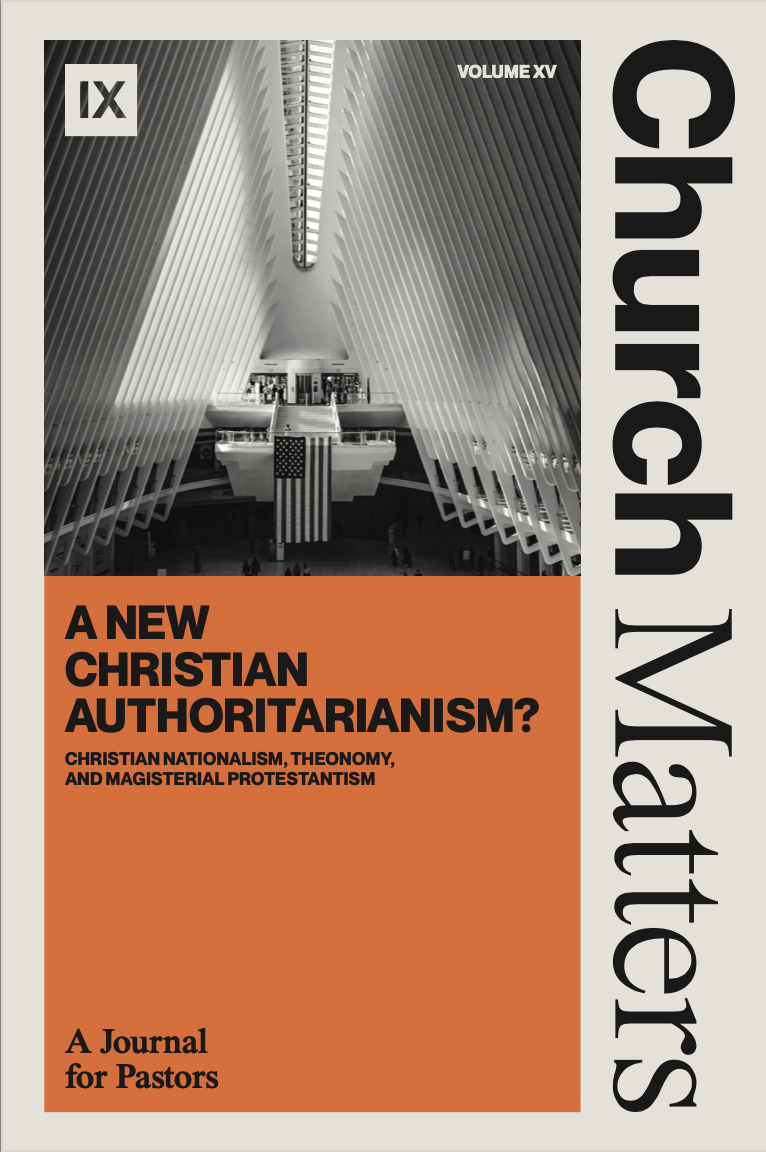Theonomy: Serious Theology, Serious Politics, Seriously Wrong
My engagement with theonomy began before I was an adult. I have experienced two periods of intense interest in this movement and theory known as theonomy, Christian reconstructionism, dominion theology, or (more recently) a comprehensive model of Christian nationalism. As a teenager, I was introduced to reconstructionism by older Christian friends, and as a young and eager Christian conservative deeply concerned about the Christian faith and the culture around me, I took it very seriously. Theonomist books and older works foundational to modern theonomist thought were put into my hands. I read them eagerly.
Later in life, leading theonomist thinkers (including Rousas John Rushdoony) would reach out to me. Having read some of my own theological work, Dr. Rushdoony was kind to write me and to send two of his own books. I am not a theonomist, but I take their ideas seriously, and their ideas and proposals deserve such seriousness.
Before I explain why I am not a theonomist, let me explain why this mode of Christian thinking must be taken very seriously. Upon reading theonomist analysis and argument, my first thought was that I had been lied to for many years. Furthermore, I had been lied to by Christians, including pastors and Christian authorities who had misrepresented much of Christian history, subjected the Bible to shoddy hermeneutics, misread the relationship between the church and the culture, had evidently never read many of the documents and writings they cited, and were arguing for a secular state and for Christian cultural surrender. The theonomists had actually read the documents they cited, plus they had a clear proposal and picture of the world. That put them ahead of their critics, or at least most of them.
When I refer to being lied to, I refer to the dominant argument of the day, still tenaciously held to by more secularly-minded Christians, that the American experiment in ordered liberty had been established on an intentionally secular foundation. This was especially foisted upon my generation by more liberal professors and denominational leaders, whose bad thinking was based on bad history and whose wishful thinking extended to the supposed gospel benefits of a secularizing culture. Then and now, theonomists puncture and expose that kind of evangelical foolishness with aplomb.
We are now in a second wave of theonomist revival in the United States. By my measure, the first wave came relatively late in the North American Protestant context of twentieth-century America. By that time, the rapid swing toward secularization and the radical reordering of morality and public culture had become apparent. The theonomists were not alone in sounding alarms, but they did come with a more developed answer to the obvious question: What do we do now? The second wave has come in the immediate context of America’s current cultural crisis, and some theonomists are certain of their immediate vindication. At the very least, they are generally right about the disaster of the evangelical Left.
Returning to the first wave of theonomist influence, we see that other conservative Christians responded to those times with the movement often labeled the “Christian Right.” The key difference between the theonomists and the Christian Right is that the latter sought to use traditional constitutional means to recover and redirect culture and society. The theonomists meant (and now mean) to replace and reconstruct the constitutional order. They saw the existing American order as unsustainable and fundamentally sub-biblical. They were certain that the existing constitutional order was flawed from the start and doomed to fail. Furthermore, they saw the crisis of the American constitutional order in explicitly theological terms.
So, why am I not a theonomist? The most salient factor in my rejection of theonomy is that I am a decided and incorrigible conversionist. Furthermore, I am a Baptist by conviction, formation, and church membership. The central practical implication of conversionism is the separation of all human beings into two categories—those who, by grace, have been born again, have confessed Christ, and who live obedient lives under the lordship of Christ, and ultimately for his glorious kingdom; and those who, having never heard the gospel or having refused its call, remain unregenerate and defiant. I believe in a church that includes only the confessing redeemed and a larger society that includes true Christians, artificial Christians, and pagans of all varieties.
Now, mark this carefully: I do not celebrate the presence of artificial Christians and pagans in our society. The theonomists are on unassailable gospel ground when they scorn limp-minded evangelicals who celebrate religious pluralism as a fact. A central error of the theonomists is seeing the civil government as assigned an explicitly religious duty and (among some theonomists) touching the duty of separating the sheep from the goats. Thus, theonomy risks conflating the identity of the church and civil society as a matter of law and polity.
I do not believe it is possible for a Baptist to be a theonomist with any consistency. I sometimes feel the temptation, and I share the theonomic frustration with the ever-present threat of evangelical timidity and stupidity. But, and this turns out to be determinative, I am a Baptist. I am not the kind of Baptist who argues for a secular state and what Richard John Neuhaus called a “naked public square.” As a matter of fact, I believe that the modern secularist dream has turned into a predictable nightmare. I would argue that our American constitutional order is only plausible when a fundamentally Christian worldview provides the background conditions for our conception of law, liberty, rights, dignity, civitas, and morality. The deliberate subversion of that Christian foundation has created a set of conditions in which the American constitutional order is increasingly implausible.
To state the matter straightforwardly: A society that has lost the stable categories of boy and girl and defiantly destroys life in the womb is a society that renders the American experiment in ordered liberty impossible. Ordered liberty becomes disordered calamity. The only recovery is ontological and moral and, yes, theological. But that necessary affirmation of a foundation of Christian morality and the biblical affirmation of law, liberty, and dignity as essential to the American order must not exacerbate confusion between the regenerate and the unregenerate.
If I were a Presbyterian (no doubt frightening actual Presbyterians as I write this), I would still reject theonomy and see it as contradictory to the teaching of John Calvin and the doctrinal requirements of the Westminster Confession of Faith. Following Calvin, the Westminster divines recognized a distinction between the moral, ceremonial, and civil law. Theonomists argue for the legislation of Old Testament law, but the Westminster confession, at the very least, recognizes that “sundry judicial laws” given to Israel “expired together with the state of that people, not obliging any other now, further than the general equity thereof may require.”[1]
But I must also argue that some form of paedobaptism seems necessary to the theonomist vision and, by deep and abiding conviction, I am not and cannot be a paedobaptist. If victorious, at some point the paedobaptist theonomists will come for me and my fellow Baptists. We will fight back with Word and water.
The theonomists have made me a better and more consistent thinker about both the ideal condition and the current crisis of church and civil society. I am certain that many of their intellectual enemies are frauds and fools. I am also certain, Baptist that I am, that the theonomist confusion of categories will certainly fail to bring about the society they envision were they to gain control. I stalwartly insist that conversion is normative for the Christian and for the church. I want to see an honest assertion of a necessary and explicit Christian foundation to the American order. I do not celebrate the secular state. I long for the rule of Christ and the saints. I believe such a rule will one day come in fullness. But that day will be announced with the blast of a trumpet, not a conference on theonomy.
* * * * *
[1] This case is made very well by Professor Sinclair Ferguson in his essay, “An Assembly of Theonomists? The Teaching of the Westminster Divines on the Law of God,” in William S. Barker, W. Robert Godfrey, editors, Theonomy: A Reformed Critique (Grand Rapids: Zondervan, 1990), pp. 315-352.
Related Multimedia

Fundamentalism May Feel Safe, But It’s Shortsighted
By Phil Newton









